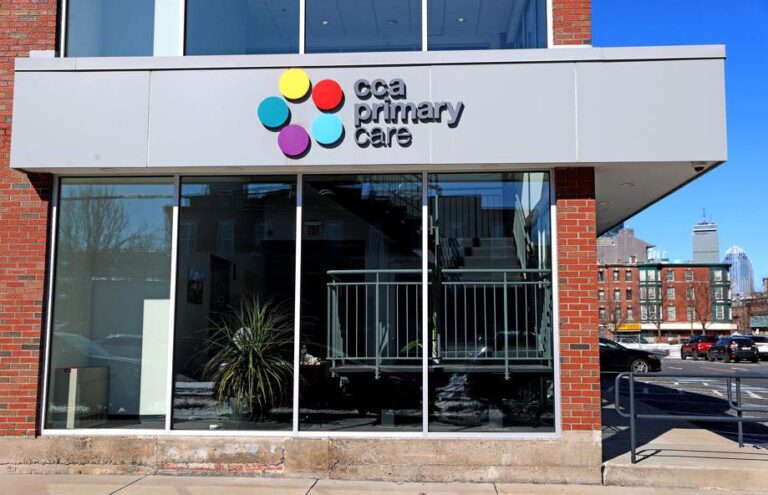State officials said this week they are preparing in case Commonwealth Care Alliance collapses, in an effort to protect the health care of the struggling insurer’s nearly 50,000 elderly, disabled, and low-income members.
In case members must transfer to a more basic version of the state’s Medicaid program, MassHealth, the state has sought proposals from vendors who could take over the intensive work of coordinating patients’ care, a service that Commonwealth Care provided but MassHealth‘s basic platform typically does not. State officials also said they may need to step in and help run CCA’s two primary care clinics in Boston and Springfield, should the nonprofit stop being able to keep them open.
“CCA has such a long and storied history, it’s easy to think about what it was — but what it is right now is as an insurance company that’s in very deep financial trouble, and so our job is to make sure that the services continue,’’ Kate Walsh, state secretary of Health and Human Services, said Tuesday.
The state has for months raised concerns about the stability of Commonwealth Care, which has been running out of money, records show. The organization acts predominantly as an insurer for people simultaneously eligible for Medicaid, which serves mostly low-income people, and Medicare, which helps largely people over 65 and those with disabilities. For some, the nonprofit also acts as a service provider, offering care through several avenues including two primary care practices.
In many ways, the organization’s programs go beyond what is typical of an insurer, and it’s deeply involved in a patient’s care, often coordinating multiple specialists, appointments, and services, leaving members and disability advocates deeply concerned about the organization’s trajectory.
Commonwealth Care Alliance declined to comment.
Walsh’s comments came during a forum Tuesday hosted by the Disability Advocates Advancing Our Healthcare Rights coalition, where she and other state officials said they were committed to ensuring that Commonwealth Care’s services remain undisrupted, even if its insurance arm collapses.
“It’s destabilizing enough to worry about the economics of an insurance plan that you come to rely on, but you certainly don’t want to have to change your doctor, don’t want to have to change your psychiatrist, don’t want to have to change your physical therapist,’’ Walsh said. “We want to be very sure that we can, wherever possible, ensure continuity to the providers that have been caring for you and maintaining your independence and dignity and resilience over the last 10 years.’’
Last week, the state issued a request for vendors who could take over the care coordination work that Commonwealth Care has been providing, should patients be forced to transfer their insurance to regular MassHealth.
Walsh also said the state was “fully committed’’ to working with Commonwealth Care to preserve operation of its two primary care practices in Boston and Springfield, which collectively serve 1,100 patients. A spokesperson for MassHealth also said the state would be willing to step in if necessary to keep the clinics running.
The forum was held, in part, to discuss what kinds of care might be affected were Commonwealth Care to close.
Walsh said the state was committed to supporting everything that came along with the model for which Commonwealth Care was known.
“CCA is not losing money because Medicaid didn’t pay them enough,’’ she said. “We actually believe there are dollars in the system to support all of the services that you’re talking about. … I’m not convinced this is going to be the end of what you know.’’
Despite Walsh’s assurances that the state would maintain all the benefits Commonwealth Care members currently receive, advocates still voiced concern.
While other insurers offer the same products as Commonwealth Care, Commonwealth Care has a reputation for being more generous. Members could also choose to go to regular MassHealth, but even with the state supplementing some care management with vendors, disability advocates said some services may be abandoned without the holistic, individualized, “enhanced’’ support Commonwealth Care currently provides.
“For you to be able to say, ‘Yes, we have choice.’ Yeah, we do. We have choice to enroll in a plan that doesn’t come anywhere near CCA,’’ said Charlie Carr, a legislative liaison for the Disability Policy Consortium advocacy group. “So I think a number of people with complex disabilities like myself will just opt for (basic Medicaid) rather than go into a plan which is insufficient and doesn’t meet our needs.’’
Dennis Heaphy, who is a member of Commonwealth Care and a longtime disability advocate, said members could be at risk of losing crucial benefits such as free over-the-counter medications and enhanced transportation coordination, which he said were not available under basic MassHealth services.
“At this point, we don’t have a clear indication of how MassHealth will ensure everyone gets enhanced services,’’ he said.
More broadly, what was at risk was a program built around the member, Heaphy said. For example, if an individual needed a piece of medical equipment, Commonwealth Care had long provided it, rather than make members jump through monthslong insurance approvals, or offering a cheaper version than what the doctor had ordered to reduce costs in the short-term.
“What seems to be getting lost in this conversation is … the broader CCA insurance world will be put into insurance companies and plans that probably will not have embraced or not been shaped by the disability rights movement as CCA was,’’ Heaphy said. “It’s their ethos.’’
State officials have increasingly flagged and voiced concern about the direction of Commonwealth Care for the past year. In October, MassHealth officials noted in a letter to the nonprofit that the insurer projected having “less than zero cash on hand’’ by the first quarter of 2025 and had taken out a $120-million line of credit that was due to be paid back in three months.
The insurer’s reserves were also $216.4 million below solvency thresholds for two of its MassHealth products: one for disabled individuals under 65 called One Care, and a product for low-income seniors known as Senior Care Options. In November, the state froze new enrollments in both the MassHealth programs.
Disability advocates say they understood the organization was looking to be acquired, but that a buyer had not materialized, and have been pushing for the state to put the insurer into receivership.
Matt Selig, executive director of Health Law Advocates, a public interest law firm working on behalf of the Disability Policy Consortium, said the attorney general still has the statutory authority to take over the organization.
A spokesperson for the attorney general’s office did not immediately respond to a request for comment.
As uncertainty swirls, the organization has sought to reassure its members. In a memo circulated to staff, Commonwealth Care told employees to “transition conversation to routine matters’’ if members asked about the Boston Globe’s article earlier this month about the organization’s financial struggles. If someone asked if CCA was closing, staff were to tell them the organization remained open for business as usual. If members pushed, staff were to direct them to discuss their health plan options with a counselor.
If asked about being fearful of losing their jobs, staff were instructed to say: “My focus is on delivering the support you and our other members rely on.’’
Jessica Bartlett can be reached at jessica.bartlett@globe.com. Follow her @ByJessBartlett.



